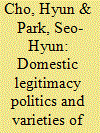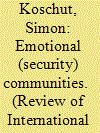|
|
|
Sort Order |
|
|
|
Items / Page
|
|
|
|
|
|
|
| Srl | Item |
| 1 |
ID:
135287


|
|
|
|
|
| Summary/Abstract |
Political cosmopolitanism comes in many different shapes and sizes. Despite its intellectual diversity, cosmopolitanism typically agrees on one crucial matter: any prospective global democracy is best envisioned not in terms of a hierarchical world state, but instead as a multilayered system of global governance resting on an unprecedented dispersion of decision-making authority. In discarding traditional ideas of world government, cosmopolitans typically succumb to a series of mistakes. First, they presuppose unfairly dismissive accounts of world government. Second, they misleadingly contrast their own multilayered and (allegedly) institutionally novel vision to early modern (for example, Hobbesian) ideas of sovereignty, or to Max Weber's influential definition of the modern state. They thus obscure the fact that the modern state's diverse manifestations can only be partly grasped by ideal-types drawn from either Hobbes or Weber. Consequently, they depend on straw person accounts of the modern state. Third, envisioning their proposals as building on the familiar ideal of institutional checks and balances, they misconstrue the contribution that checks and balances can make to global-level democracy. Their hostility to statist ideas about global democracy notwithstanding, their proposals sometimes mimic core attributes of traditional statehood, and they tend inadvertently to ‘bring the state back in’ to global democracy.
|
|
|
|
|
|
|
|
|
|
|
|
|
|
|
|
| 2 |
ID:
135294


|
|
|
|
|
| Summary/Abstract |
What drives East Asian regionalism? The rise of China and the perceived decline in the influence of the United States have sparked debates about the future of the regional order, including the yet-unresolved question of whose leadership is likely to be more stable and accepted as legitimate by other regional actors. What is puzzling, however, is that persistent demands for the formation of a coherent and uniquely East Asian regional institution have come not from China or the US, as is the focus of existing studies, but rather Japan and South Korea. In this article, we propose an alternative framework that conceptualises the varieties of East Asian regionalism, emphasising the multiple pivots and variegated levels of politics involved in efforts toward regional cooperation. We find that competing proposals for East Asian regionalism since the 1990s are not determined by structural pressures or the convergence of interests but rather result from domestic legitimacy politics. Japanese and Korean leaders have, at different time periods, proposed their own alternative region-making initiatives appealing to domestically contested views on how best to seek autonomy from the region's Great Powers as a way to enhance their political standing domestically and regionally.
|
|
|
|
|
|
|
|
|
|
|
|
|
|
|
|
| 3 |
ID:
135292


|
|
|
|
|
| Summary/Abstract |
What do Al-Qaeda, Human Rights Watch, and NATO have in common? They can all be understood as emotional communities. Emotional communities are ‘groups in which people adhere to the same norms of emotional expression and value – or devalue – the same or related emotions’. This article develops a conceptual framework for a particular type of emotional community in world politics: a security community. It is argued that emotion norms – the expression of appropriate emotions in a given situation – stabilise a security community during inter-allied conflict. The argument is illustrated by an empirical case study of NATO's military intervention in Libya in 2011. The article shows how the conceptualisation of security communities as emotional communities has significant implications for the study of regional peace and security.
|
|
|
|
|
|
|
|
|
|
|
|
|
|
|
|
| 4 |
ID:
135295


|
|
|
|
|
| Summary/Abstract |
Comparisons of peacebuilding with historic practices of imperialism are common, but these comparisons have sustained a hegemonic antagonism between humanitarian and imperialist interpretations of international peace intervention. This article argues that this common framing externalises the problem of intervention, romanticises local resistance, and forecloses to investigation the articulation between militarised peace practices and transnational capitalist relations. To do so, the article analyses the case of Francophone Africa, thus providing a context that has been left unexplored in peacebuilding debates. By bringing back in the historicity of particular Franco-African imperial experiences into peacebuilding research, the article reveals the militarisation of politics, transnational elite networks, and the dominant intellectual predispositions that work to reproduce the legitimacy of hegemonic practices of ‘peace’ interventionism. In the last section, the article analyses the debates over the UN-French 2011 intervention in Côte d'Ivoire to reveal the connections between the ethics of humanitarian interventions and the political economy of imperialism. The article concludes that the imperial legacy of peacebuilding is found in old capabilities, new organising logics, and specific practices and power relations and that to focus on the humanitarian-imperialist antagonism caricatures the relationships between ‘local’ and ‘international’ actors.
|
|
|
|
|
|
|
|
|
|
|
|
|
|
|
|
| 5 |
ID:
135289


|
|
|
|
|
| Summary/Abstract |
The European Union's (EU) trade and development ‘partnership’ with the African, Caribbean, and Pacific (ACP) countries has long interested scholars of North-South relations. Historically, the theoretical literature on ACP-EU ties has been characterised by liberal institutionalist accounts of interdependence and critical assessments of Europe's neo-colonialism. In the timeframe of the Cotonou Agreement (2000–20), this division has expressed itself in relation to liberal assessments of Europe's pursuit of pro-poor market reforms in the Post-Washington Consensus and critical accounts of Europe's neoliberal ‘development’ agenda. This article argues that a moral political economy offers an innovative lens for the latter critical assessment of ACP-EU ties. With a constructivist focus on Europe's normative ‘development’ agenda, a moral economy standpoint may draw attention to the EU's role in (re)embedding poverty through recourse to legitimating ethical discourse. This is seen to enable the critical school to more closely consider ideational/discursive power in response to contemporary liberal institutionalist accounts. The article focuses on the European Investment Bank (EIB) and its activities in ACP countries – with particular focus on the Bank's Investment Facility (IF) – as an exemplar of the disjuncture between norms and outcomes.
|
|
|
|
|
|
|
|
|
|
|
|
|
|
|
|
| 6 |
ID:
135290


|
|
|
|
|
| Summary/Abstract |
Scholarship has traditionally portrayed transnational NGOs (TNGOs) as ‘principled’ actors animated by global norms to advance human rights, sustainable development, humanitarian relief, environmental stewardship, and conflict resolution. However, scholarship has also identified instances in which TNGOs appear to act ‘instrumentally’ by engaging in resource-maximising behaviour seemingly inconsistent with their principled nature. Moreover, prior scholarship addressing this puzzle has been constrained by the limitations of small-n case studies examining relatively narrow subsectors of the TNGO community. Addressing these limitations, we reexamine the logic of TNGO behaviour in light of findings from an interdisciplinary, mixed-method research initiative consisting of in-depth, face-to-face interviews with a diverse sample of 152 top organisational leaders from all major sectors of TNGO activity. Using an inductive approach to discover how TNGO leaders understand their own behaviour, we introduce the heuristic of ‘principled instrumentalism’ and specify our framework with a formal model.
|
|
|
|
|
|
|
|
|
|
|
|
|
|
|
|
| 7 |
ID:
135288


|
|
|
|
|
| Summary/Abstract |
This article seeks to add to the exploration and development of Imperial History's contribution to the discipline of International Relations (IR). Focusing on British perceptions of Afghanistan in the period preceding the first Anglo-Afghan war the article considers colonial knowledge as a source of identity construction, but in a manner that avoids deploying anachronistic concepts, in this case that of the Afghan ‘state’. This approach, which draws on the insights brought to IR by historical sociology, shows that engaging with Imperial History within IR can encourage a more reflexive attitude to core disciplinary categories. This not only reveals alternative approaches to the construction of specific political communities but it also allows for a more historicist mode in the use of history by IR as a discipline. Furthermore, by moving away from material based purely on diplomatic history, Afghanistan's imperial encounter can be recovered from the dominance of ‘Great Game’ narratives, offering an account that is more appreciative of the Afghanistan context.
|
|
|
|
|
|
|
|
|
|
|
|
|
|
|
|
| 8 |
ID:
135293


|
|
|
|
|
| Summary/Abstract |
This article argues that 1945 constitutes an historical inflection point from a period of state expansion to state contraction and that this transformation is primarily the result of changes at the international level. Just as security and economic pressures drove lead states to expand in earlier times, changing conditions in the post-1945 period led to a contraction in state size. The change from multipolarity, the development of the territorial integrity norm, the shift to nuclear deterrence, and the burgeoning global economy contributed to the milieu in which states evaluate the costs and benefits of holding territory, and this has enabled states to permit secession more frequently. The result has been an increase in the rate of peaceful secession and a corresponding proliferation in the number of sovereign states. I test this argument both qualitatively and quantitatively using original data on secessionist movements and internal administrative regions between 1816 and 2005.
|
|
|
|
|
|
|
|
|
|
|
|
|
|
|
|
| 9 |
ID:
135291


|
|
|
|
|
| Summary/Abstract |
IR scholars have recently paid increasing attention to unequal institutional orders in world politics, arguing that global governance institutions are deeply shaped by power inequalities among states. Yet, the literature still suffers from conceptual limitations and from a shortage of empirical work. The article addresses these shortcomings through a study of the historical evolution of global arms control institutions since 1945. It shows that in this important policy area, the global institutional order has not been marked by a recent trend toward deeper inequality, as many writings on unequal institutions suggest. Instead, the analysis reveals a pattern of institutional mutation whereby specific forms of institutional inequality are recurrently replaced and supplemented by new forms. This process, the article argues, is driven by states' efforts to adapt the regime to a changing material and normative environment within the constraints of past institutional legacies.
|
|
|
|
|
|
|
|
|
|
|
|
|
|
|
|
|
|
|
|
|